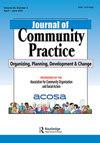Using research to build power: the Pittsburgh Wage study
IF 1.2
Q2 SOCIAL WORK
引用次数: 0
Abstract
ABSTRACTSocial workers seek to address numerous forms of oppression. While our research has focused on extensively documenting problems, solutions often remain out of grasp. Many schools of social work remain entrenched in traditional academic structures focused on narrow measures of academic success and impact. This article critiques these measures, proposing a framework for using research to build community power for societal impact. Using the Pittsburgh Wage Study as a case study, it argues engaged research offers an opportunity to move from documenting problems to demonstrating how research can build the power of community groups involved in developing solutions. Based on our experiences, we offer a framework for using research to build power, arguing we need to build relationships by showing up and listening, center the questions our partners want answered, use multiple methods and approaches, move quickly when asked, develop a broad set of products outside of journal articles, and embrace politics where needed.KEYWORDS: Organizinglabor Disclosure statementNo potential conflict of interest was reported by the authors.Additional informationFundingThe work was supported by The Heinz Endowments.利用研究建立权力:匹兹堡工资研究
社会工作者试图解决各种形式的压迫。虽然我们的研究集中在广泛地记录问题,但解决方案往往仍然难以掌握。许多社会工作学校仍然固守传统的学术结构,专注于狭隘的学术成就和影响。本文对这些措施进行了批评,提出了一个利用研究建立社区力量以产生社会影响的框架。以匹兹堡工资研究为例,它认为,参与式研究提供了一个机会,可以从记录问题转向展示研究如何能够建立参与制定解决方案的社区团体的力量。根据我们的经验,我们提供了一个利用研究来建立权力的框架,认为我们需要通过出现和倾听来建立关系,关注我们的合作伙伴想要回答的问题,使用多种方法和途径,在被问及时迅速采取行动,在期刊文章之外开发一系列广泛的产品,并在必要时接受政治。关键词:组织劳动披露声明作者未报告潜在的利益冲突。这项工作得到了亨氏基金会的支持。
本文章由计算机程序翻译,如有差异,请以英文原文为准。
求助全文
约1分钟内获得全文
求助全文
来源期刊

Journal of Community Practice
SOCIAL WORK-
CiteScore
2.40
自引率
18.20%
发文量
27
期刊介绍:
The Journal of Community Practice is an interdisciplinary journal grounded in social work. It is designed to provide a forum for community practice, including community organizing, planning, social administration, organizational development, community development, and social change. The journal contributes to the advancement of knowledge related to numerous disciplines, including social work and the social sciences, urban planning, social and economic development, community organizing, policy analysis, urban and rural sociology, community health, public administration, and nonprofit management. As a forum for authors and a resource for readers, this journal makes an invaluable contribution to the community"s conceptualization, applications, and practice.
 求助内容:
求助内容: 应助结果提醒方式:
应助结果提醒方式:


